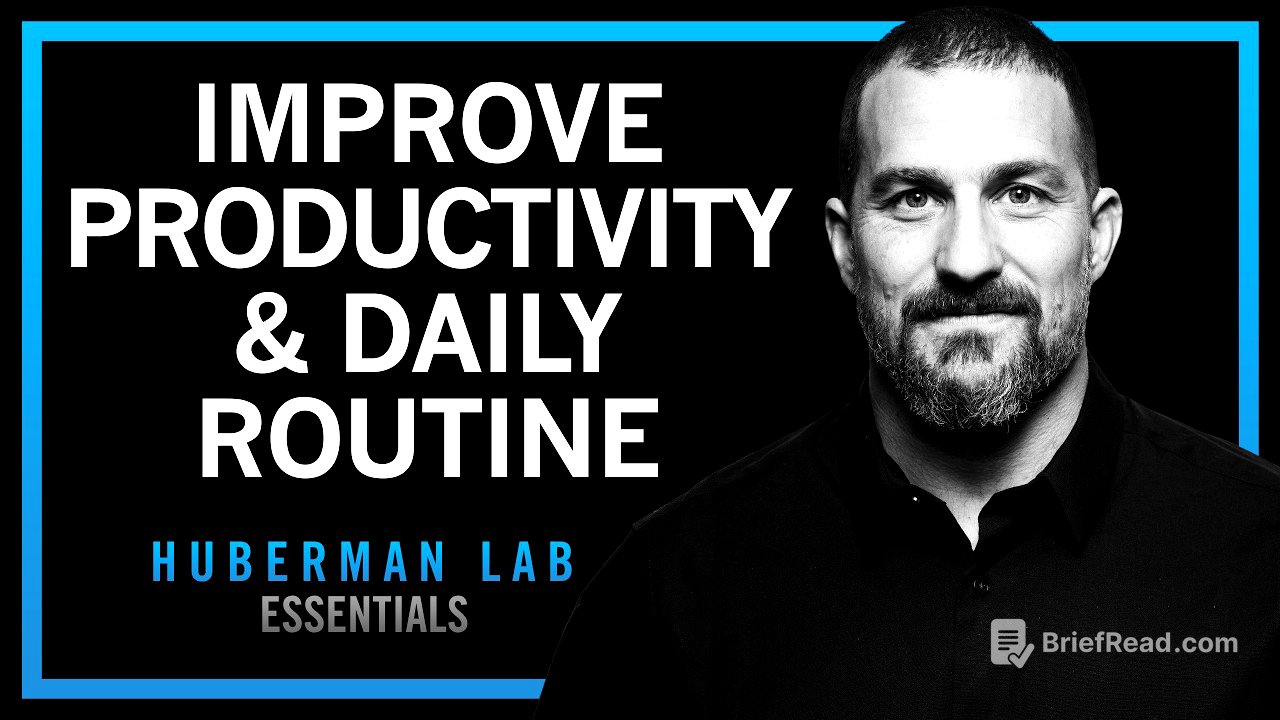TLDR;
This video provides a science-backed daily routine designed to optimise mental and physical health, covering everything from sleep to learning and creativity. Andrew Huberman shares his personal protocol, emphasising the importance of aligning daily activities with the body's natural circadian rhythms. Key points include:
- Morning sunlight exposure and a walk to regulate cortisol and reduce anxiety.
- Strategic caffeine timing and intermittent fasting to enhance focus.
- Optimising workspace ergonomics for alertness.
- Timing work bouts with body temperature fluctuations.
- Prioritising sleep hygiene with temperature control and supplements.
Office Hours, Example Daily Protocol [0:00]
Andrew Huberman introduces the concept of "office hours" to address frequently asked questions about mental and physical health. He structures the discussion around a typical day, highlighting the importance of aligning daily activities with the body's natural 24-hour rhythms. This approach is rooted in the understanding that every cell and organ in the body is modulated by these predictable rhythms, making the daily routine a powerful tool for optimising various aspects of life.
Morning, Tools: Temperature Minimum, Walk, Sunlight & Cortisol [1:48]
Huberman begins his day around 6:00-6:30 a.m. and immediately notes the wake-up time to track his temperature minimum, which occurs approximately two hours before his average wake time. He then takes a morning walk to generate optic flow, which reduces amygdala activity and lowers anxiety. This walk is done outdoors to ensure sunlight exposure, which is vital for mental and physical health. Sunlight stimulates melanopsin neurons, signalling daytime to the brain and triggering biological processes throughout the body. This also helps time the daily cortisol pulse, promoting wakefulness and a healthy immune system.
Hydration, Electrolytes, Tool: Delay Caffeine [5:30]
Huberman emphasises the importance of hydration for mental performance, noting that neurons require sodium, magnesium, and potassium to function optimally. He drinks water with a small amount of sea salt to replenish electrolytes lost overnight. He delays caffeine intake for 90-120 minutes after waking to allow adenosine to clear, preventing a later caffeine crash. This strategic timing helps maintain consistent energy levels throughout the day and supports a natural decline in energy towards sleep.
Morning Focus, Fasting [7:39]
To enhance focus early in the day, Huberman practices intermittent fasting, abstaining from food until around 11:00 a.m. or 12 noon. Fasting increases adrenaline (epinephrine) levels, which, in optimal ranges, improve learning and concentration. While excessive adrenaline can cause stress and jitteriness, controlled levels promote heightened focus and information retention.
Tools: Optimize Workspace, Screen Position, Work Bouts [8:27]
Huberman optimises his workspace to promote alertness by positioning his screen at or slightly above eye level. Looking upward increases alertness due to the connection between eye muscles and brain stem neurons. He works in 90-minute bouts, aligning with the brain's ultradian cycles, which alternate between high and low alertness. During these work sessions, he turns off his phone and uses low-level white noise to create an environment conducive to learning and workflow.
Tool: Timing Work Bouts, Temperature Minimum [11:38]
The timing of the 90-minute work bout is strategically aligned with the body's temperature fluctuations. The ideal time for focused work is 4-6 hours after the temperature minimum, coinciding with the steepest rise in body temperature. This approach leverages the body's natural physiology to support focus, rather than working against it during periods of defocus and lethargy.
Exercise, Strength & Hypertrophy, Endurance Training, Tool: 80/20 Workouts [13:55]
After the work bout, Huberman engages in physical exercise to support brain health and overall function. He categorises exercise into strength/hypertrophy and endurance training, emphasising the benefits of both for producing brain-derived neurotrophic factor (BDNF) and regulating inflammatory cytokines. He follows an 80/20 rule, where 80% of resistance training is done without reaching failure, and 20% involves higher intensity training to failure. This principle also applies to endurance work, with short bursts past the lactate threshold to support brain health.
Afternoon, Meal Timing, Carbs, Omega-3s, Tool: Afternoon Walks & Light [16:55]
Huberman eats his first meal around noon, prioritising protein and vegetables with limited carbohydrates to maintain alertness. If he has exercised, he includes starches like rice or oatmeal. He highlights the importance of omega-3 fatty acids for mood, recommending at least 1,000 milligrams of EPA per day. After lunch, he takes a brief walk to accelerate metabolism and improve nutrient utilisation, while also exposing himself to more light. Viewing sunlight in the afternoon lowers retinal sensitivity, buffering against the negative effects of bright light later in the evening.
Dinner, Sleep Transition, Carbs, Serotonin [21:40]
Dinner is focused on optimising the transition to sleep, consisting of starchy carbohydrates and some protein to increase serotonin levels. Serotonin aids in falling asleep, and consuming carbohydrates in the evening supports this process. Huberman avoids supplementing directly with serotonin or its precursors, as it can disrupt sleep architecture. The evening meal replenishes glycogen stores, benefiting both muscle and brain function.
Accelerate Sleep, Tool: Reduce Temperature & Hot Baths [24:51]
To improve sleep, Huberman leverages the body's natural temperature drop, which is essential for falling and staying asleep. He accelerates this process by taking hot baths or showers, which paradoxically help the body cool down more quickly afterwards. He also emphasises the importance of a dark, cool room to facilitate sleep, as the body regulates temperature through mechanisms like exposing hands or feet during the night.
Sleep Supplements, Magnesium, Apigenin, Theanine; Waking at Night [26:41]
Huberman discusses supplements that can aid the transition to sleep, including magnesium threonate or glycinate (300-400mg), apigenin (50mg), and theanine. These compounds promote GABA release and reduce forebrain activity, helping to reduce rumination and anxiety. For those who wake up in the middle of the night, he advises addressing potential causes such as an early melatonin pulse (by going to bed earlier) or anxiety. If using lights, keep them dim and turn them off quickly.
Example Daily Routine, Work Blocks [29:41]
Huberman reiterates the importance of the morning 90-minute work block, positioning it as the time for the most demanding cognitive tasks. He typically includes a second work block later in the day. While he carves out boundaries around these work blocks, he acknowledges the need to adapt and modify the routine to individual schedules. The goal is to provide scientific support and specific protocols that can be leveraged to optimise one's own life.









